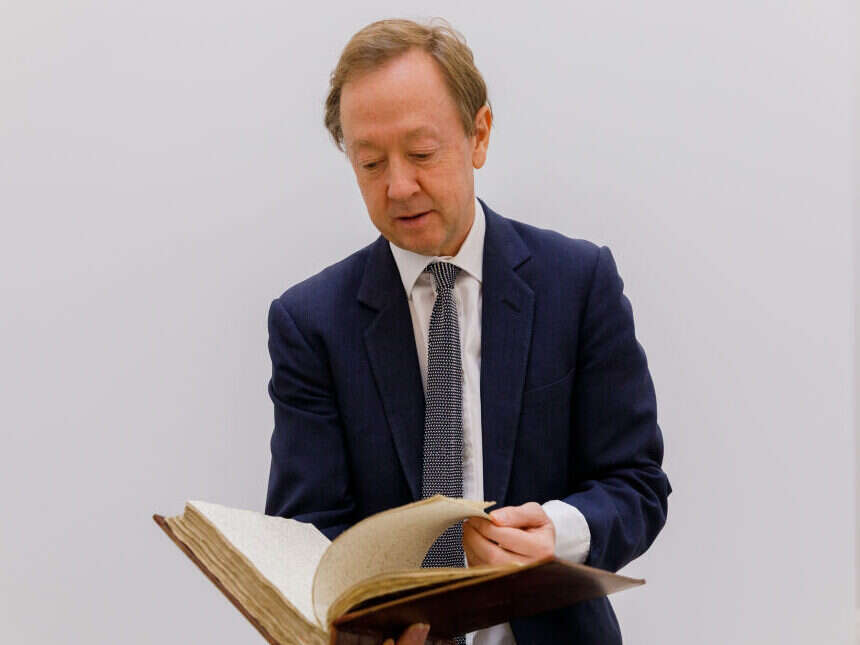
Former Daily Mail editor Geordie Greig has revealed details of the meeting in which he was fired from the job by the newspaper’s proprietor Lord Rothermere.
Greig described how he was summoned to see Rothermere in November 2021 and had a “very short conversation” signalling the end of his role. A month later Rothermere won shareholder approval to take parent company DMGT private.
In a rare interview with The Media Show on BBC Radio 4, he said: “It’s quite a simple story, that I was asked to go and see the proprietor Lord Rothermere and he began saying various things about the economic climate and I had an intuition that he was trying to fire me.
“And so I said ‘Jonathan, I think you’re trying to fire me’. And he went ‘oh, this is very difficult’.
“He was very gracious. And I said ‘let’s just leave it there’. So it was a very, very short conversation.”
Greig, who led the Daily Mail for three years after six years editing the Mail on Sunday, said he still did not fully understand the reasons for his dismissal but “people have many theories”.
“I am of the simple belief that editors are a bit like football managers, that the owner of the club has a right to move the personnel around,” he said.
Under Greig, the Daily Mail was critical of Boris Johnson and his government, breaking stories like “Wallpaper-gate” around the then-prime minister’s spending on redecorating No. 10 Downing Street and asking questions such as “What planet are they on?” after he backed Dominic Cummings following the aide’s lockdown-breaking trip to Durham.
Since his departure, with former Mail on Sunday editor Ted Verity becoming editor-in-chief of a seven-day operation across the Mail titles, the daily paper has again become less critical of Johnson and the Conservatives as it was previously under Paul Dacre (who remains in an advisory editor-in-chief position).
Asked whether he thought Johnson may have had a hand in his departure, Greig said: “So many theories have gone around. Do I think he called the proprietor and said you must get rid of Greig? No.
“I’m just so pleased to have had the experience of being there – but more pleased to be at The Independent, which as I say is this incredible sleeping giant. People have not fully understood that it’s the largest digital quality newspaper in Britain.”
Greig was appointed as editor of The Independent in January. He joined shortly after the online-only title revealed plans to cut about a fifth of staff due to the industry-wide digital advertising downturn.
According to Greig, the title is already recovering. He said: “It’s just astonishing how advertisers, our commercial partners, are coming forward with exciting new plans, with new contracts.
“I mean, our aim is always to try and grow the journalism and in every recession there are really painful cuts and all one’s sympathy goes out for people who suffer those. It’s not fun in any sense. It’s painful, it’s difficult.
“My aim is to grow the brand, particularly in America with e-commerce, with television,” he said, adding that there is also “enormous scope” with advertising clients in the UK. He later said the title “invest[s] in journalism constantly”.
According to industry-recognised data from Ipsos iris in Press Gazette’s latest ranking, The Independent is the fifth biggest news website in the UK – and the biggest “quality” news brand as the newspapers were traditionally classified. It had an audience of 22.1 million people in the UK in February, compared to 20.7 million at The Guardian, 16.1 million at The Telegraph and 13.3 million for The Times.
Asked about largest shareholder Evgeny Lebedev’s relationship with The Independent, Greig said: “He is not actively involved in the publication.”
Greig cited a shareholders’ agreement featuring a covenant stating there will not be any editorial interference, and said The Independent’s coverage of Russia and other political events around the world has been “robust”.
Greig first met Lebedev when he was editor of Tatler, co-hosting a party the Russian businessman was organising on behalf of former Soviet Union leader Mikhail Gorbachev, and later became editor of the Evening Standard when Lebedev and his father Alexander first bought it from Lord Rothermere’s Daily Mail and General Trust in 2009.
Email pged@pressgazette.co.uk to point out mistakes, provide story tips or send in a letter for publication on our "Letters Page" blog
